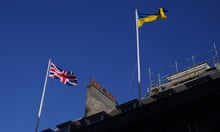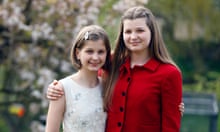How should we regard the two faces of Europe’s refugee response? In the week when the European Union welcomed nearly two million refugees from Ukraine, do we also need to watch graphic footage of a young African being battered for climbing a European border fence? Yes, we do.
As Europe rediscovers compassion for refugees, we should watch this video on loop. It shows a defenceless young man in tattered clothes gingerly descending a six-metre fence. Waiting for him at the bottom are half a dozen Spanish border police, in helmets and body armour and wielding batons. The first blow is struck before he reaches the ground. The images that follow, of a crowd of uniformed white men viciously beating a black man, are all the more disturbing because they are so familiar.
Spain’s Melilla, one of two small exclaves of EU land on the African continent, has long been the strongest distillation of fortress Europe. Melilla’s ring-fenced honey pot of golf courses, casinos and corruption have provided these images before. But now it is especially important to look at them and think hard.
A generation of people across Europe have spent the last several days wondering where they would go, what they would take with them if a larger war erupted. The distance and sense of otherness that helped us ignore the war in Syria or the collapse of Afghanistan have not been on offer in Ukraine.
There are compelling reasons why the war in Ukraine has prompted Europe’s rediscovery of compassion. As a British army veteran and volunteer in Ukraine said, “it’s a black-and-white war”, or, as others point out, Ukraine is a country next door. There are questions of culture and then, of course, there is race.
The war in Ukraine creates asylum seekers who fit the simplest definition of a refugee. Thus far, they are mainly women and children, and they are seen on TV to be crossing a single border. Coming after a dark and divisive period in which asylum in Europe has been under real threat, with lives lost and border walls built, the outpouring of compassion is moving and welcome. But the simplification and segregation are not. The Ukraine refugees are crossing into Poland, a country still busy constructing a wall along the Belarus stretch of its border to prevent the entry of Syrians, Afghans and Iraqis.
There have been disturbing levels of discrimination faced by non-European-heritage refugees fleeing the Russian onslaught in Ukraine itself. The reporting of this needs to be presented with nuance, context and balance. Not everything presented as racism should be so simply described. But there have been verified incidents of people of colour being barred from evacuation trains, being segregated and made to wait for days at border crossings.
There will be those who imagine that open arms for Ukrainians and fortress Europe for black and brown refugees can and should co-exist. They are wrong, and not only on an obvious moral level. Too many commentators in Europe have already fallen into the trap of separating deserving and undeserving refugees. Their rightful praise for Ukrainians has been laced with references to supposed exceptional qualities such as pluck and fighting spirit. These are insults that are heard and understood by Syrians, Afghans and others, who have been recently received with brutality at some of the same borders and, in the case of Syria, after fighting the same aggressor.
The segregation of black refugees at some of Ukraine’s exit points and the double standards on who gets to remain in the EU offer Putin and other malign actors a playbook for destabilising the EU. The plaintive panic with which Poland and Brussels received the prospect of a few thousands Iraqis, Afghans and Syrians arriving via Belarus offers a glaring weakness to exploit.
The neighbourhood authoritarians from Moscow and Minsk to Ankara know that Europe would rather be blackmailed than reach a consensus on resettlement of asylum seekers across the EU. The deals with Turkey and Libya to warehouse refugees and migrants have made vulnerable people into a commodity, and turned our borderlands into desperate and lawless places.
These are political choices defended by recourse to lies: that Europe is unfairly burdened with refugees it can ill afford to support. These are arguments that Jordan or Turkey can maintain, but they make no sense when deployed by an ageing Europe.
Meanwhile, the response to Ukrainians’ suffering is demolishing specious old arguments about cost and space. This refugee relief effort will cost €30bn in its first year, according to the Centre for Global Development. The UNHCR foresees at least 4 million refugees being forcibly displaced, and happily the voices quibbling over these costs are few to none.
Some will be tempted to harden the fortress, to argue that Europe is full now that it shelters Ukrainians. The arrival of a refugee crisis that we are right to embrace and support is also the time to reconsider the mistakes made since 2015. The commodification of refugees and the fragility we advertise with military responses in the Aegean in 2020 and the Belarus standoff in 2021 guarantee more of what EU governments call “hybrid wars”.
Today’s actual war explodes the excuses that a rich and shrinking Europe has offered to defend its fortress. What is left is racism. It is what was waiting for the young man in tattered clothes at the foot of a giant fence. And an openly racist Europe defeats most of what we claim is at stake in terms of values in the war in Ukraine.
Daniel Howden is managing director of Lighthouse Reports, an investigative non-profit newsroom covering migration, corruption and conflict that works with leading European media










